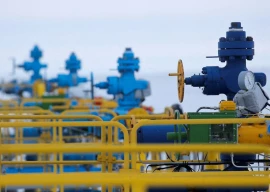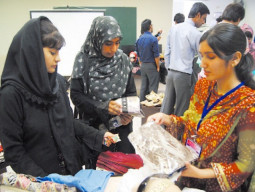
Despite the chronic shortage of gas in the country, the government’s move to import liquefied natural gas has hit several hurdles, including the skyrocketing international price of LNG and the government’s own unwillingness to conform to global industry practises by offering a sovereign guarantee to firms currently bidding to import the gas.
The petroleum ministry has been actively lobbying the Council on Common Interest (CCI) for the approval of a comprehensive incentive package for LNG import terminal operators, including a five-year tax holiday. Petroleum Secretary Ijaz Chaudhry said that the Federal Board of Revenue is amenable to such a policy.
Yet many companies, including the Turkish firm Global Energy International Pakistan (GEIP) have been reluctant to begin importing gas until the government provides a sovereign guarantee for payment, a practise that is the industry standard globally, but that violates the 2011 LNG Policy. The petroleum ministry rejected GEIP’s demand at a meeting held on December 13, on grounds that meeting the condition would require amending the policy, which in turn would delay the process.
Petroleum ministry officials are expected to brief Prime Minister Yousaf Raza Gilani on the matter at a meeting to be held in Islamabad on Tuesday (today). Sources told The Express Tribune that the ministry is expected to seek the prime minister’s intervention to resolve the matter, particularly with regard to GEIP’s demands.
At the meeting, the Oil and Gas Regulatory Authority (Ogra) is expected to argue that it will not be possible to meet GEIP’s demands and that they diverge from the expression of interest and construction licence that GEIP filed. Ogra is expected to argue that meeting GEIP’s demand would require the entire bidding process to be scrapped and restarted.
Petroleum ministry officials were more cautious in commenting about the matter. “We are examining whether the demands of GEIP are doable or not,” said the petroleum secretary.
The arrangement GEIP is looking for would involve the state-owned Sui Southern Gas Company and Sui Northern Gas Pipelines to guarantee that they will buy – and pay for – 150 million cubic feet per day (mmcfd) and 200 mmcfd respectively. GEIP specifically wants to avoid having the power companies as its end-clients since that would involve GEIP becoming entangled in the inter-corporate circular debt issue, which has financially crippled the power sector owing to the government’s inability to pay its promised subsidies.
“We have sought a payment guarantee against the supply of gas to the power sector that is unable to give guarantees itself due to the reluctance of banks to extend financing,” said one GEIP official who declined to be identified, adding that GEIP had not violated the terms of its EOI.
GEIP officials say they expect to invest $350 million in building an import terminal that will be able to provide 500 mmcfd of gas. At the current international price of close to $18 per mmcfd, that would cost about $3 billion a year and would require GEIP to have close to $1 billion in outstanding receivables at any given moment in time.
GEIP officials insist that, despite the high cost of LNG, their project would still save the country about $1 billion per annum in imports of oil to run power plants.
GEIP has also asked to reframe the Third Party Access (TPA) Rules. Ogra has said that these rules were finalised with consultation of all stakeholders and had been sent to cabinet for notification. “Any further amendment shall restart the never ending process,” said one Ogra official.
Published in The Express Tribune, December 22nd, 2011.
COMMENTS (8)
Comments are moderated and generally will be posted if they are on-topic and not abusive.
For more information, please see our Comments FAQ
1719315628-0/BeFunky-collage-(8)1719315628-0-405x300.webp)


1731329418-0/BeFunky-collage-(39)1731329418-0-165x106.webp)













With imports already rising at a fast clip and our reserves and exchange rate under pressure where is the room to import gas no matter how critically needed it may be?
@Rizwan:
You are going to pay with what for building it?
How are you going to keep terrorists from blowing it up?
How are you protect the workers from getting killed?
Set achievable, realistic goals, not some lofty idea you Islamist have like world domination. Eevn if you have the money, you will not get material to build it because of UN Sanctions on Iran. Wake Up or stop smoking whatever you are, whichever comes first. You people boast like you are developed country while you are on top of the failed state list.
@You Said It:
You are right. Only catch is private firm has to be credit worthy and prove it has the means to pay through bank accounts. Next you are going to say, Pakistan should be able to broow in the international markets at rate as USA and India. Not going to happen anytime soon, say 10 to 20 years.
@Rizwan.
The source of the gas isn't the issue -- you still have to pay for it. Iran isn't going to give you free gas -- they want to sell their gas because international sanctions have driven their currency down to record low against the USA dollar. All the talk about pipelines is a red herring the primary issue facing Pakistan is your broke - that's why you have power shortages.
The only solution to the energy crisis is Iran -pakistan Pipeline .
The claim by the official of the Turkish firm "Global Energy International Pakistan" is misleading. It is standard practice for governments to provide sovereign guarantees when the importer is a government-owned firm. In India, a sovereign guarantee is only provided for imports of public-sector energy companies like GAIL, Hindustan Petroleum, etc. Private companies that import gas use bank guarantees from their own resources.
Whether its LNG or any other source of energy -- you have to pay for the product and if the company or country is not credit worthy then you have a problem. This deal isn't really much different than any major energy deal your going to encounter - if your power companies are "dead beats" and don't pay their bills then foreign companies are going to question how your going to pay for their product.